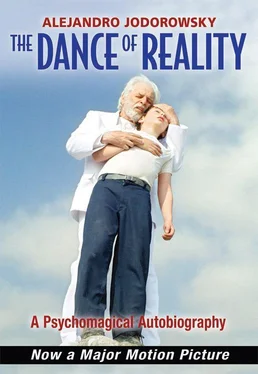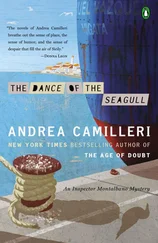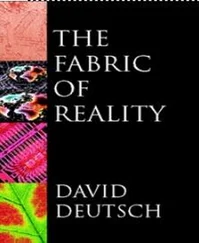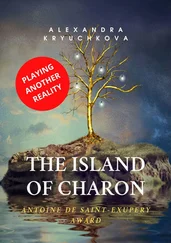We boarded the ship in religious silence. We undressed and wrapped ourselves in towels. We began to shiver. When they recovered the use of their jaws, the actors, as well as the photographer, his assistants, and the shrimpers, began to insult me. Only two remained silent. The comedian, who in the film had the role of a thief, a symbol of the primitive and egotistic Self, had behaved as such in the water: without any concern for the group, he had simply emerged from the depths and swum with all the strength of his well-developed muscles toward the boat. The other silent person was my wife, the only one of the group who had not jumped. She had remained on the deck, watching us, paralyzed or simply disbelieving. Because of this, something between the two of us was cut off forever. In that moment, we realized that our paths were going in different directions. I realized that in order to become my true self I had to cleanse myself of this leprosy that was the fear of abandonment and accept my solitude in order to one day achieve genuine connections with others.
The actors, however, declared that they did not give a damn about becoming enlightened monks and that all they had wanted was to become film stars. The dip in the Caribbean Sea was a mistake that had taught them a lesson: they would never again obey my follies as a director. To begin with, they demanded a good breakfast with orange juice, eggs, toast, cereal, butter, and jam, plus no more improvisation beyond what was in the script. Otherwise they would quit. For me, this was an essential experience. I knew that from then on I would have the courage to face the subconscious without letting myself be invaded by terror, knowing that the ship of my reason would always throw a rope out to save me.
But let us return to the lucid dream. I had just thrown myself into that gigantic being of light, and just like in the Caribbean Sea, I experienced the immensity of its power. But this time, prepared as I was by the previous experience, I did not struggle to come to the surface as if escaping from the jaws of a monster, but let myself slide toward the bottom. I had the sensation of falling slowly while dissolving, as if the light was an acid. Finally, shouting with a mixture of euphoria and peace, I let go of my last crumb of individual consciousness. I was integrated into the center. I exploded into a succession of inconceivable shapes, thousands of them, millions, and they formed worlds that evaporated, oceans of color, words, phrases, conversations in countless languages intermixed like colossal labyrinths, and as time became an eternal instant, palpitating, opening itself into endless possible of futures, I was the creating nucleus, detonating unceasingly, never stopping, never silent, in countless metamorphoses. I was shaken by a kind of violent earthquake, and eight gates opened at my inconceivable extremities, or eight bridges, eight tunnels, eight mouths — what can I call them? And from them, other universes began, also exploding with delirious creations, joining in turn with the other universes until they formed an astral mass like a colossal hive.
How long did this dream last? I do not know. The concept of duration had been abolished. I was lucky, or unlucky, that a torrential rain accompanied by gale force winds assaulted the city that night. The blinds on my windows started banging, making a racket. I woke up thinking that I was still in the dream. It took me a long time to recover my reason. The wall that separated me from the subconscious had partly crumbled. Although I knew I was an individual, in my brain I could still feel the incessant creation of images.
My brain continued to produce worlds; it was an immense hurricane of creative madness. The “I” lived within a multifaceted demented god. Reason was a small boat sailing an infinite ocean, rocked by every storm, traversed by every entity, angelic or demonic, there was no distinction; by every language, living, dead, or as yet uncreated; by the inconceivable multitude of forms; by the absolute dismembering of unity.
After this extreme vision, which in certain ways I used to create my Incal books, I did not dream again for a long time. Lucid dreams started to become a popular topic, first in the United States, then worldwide. There was even an American who tried to sell machines that could produce them. Several books were published, some of them serious, others less so, as in the case of one author who claimed to have magical powers. I read the books avidly. They helped me to understand something fundamental: people who describe their lucid dreams describe things that correspond to their level of consciousness and to their beliefs. If they are Catholic, for example, they see Christ with great emotion. If they have some form of morality, the messages in their dreams will corroborate it. I remembered having a conversation with a psychoanalyst friend who gave me examples of dreams: the patients of Freudian analysts had dreams with sexual symbols in them, Jungians had mandalas and shape shifting, Lacanians had word games, and so on. That is to say, they dream in accordance with their analysts’ theories, which for them have the power of dogma. I realized that something similar happened with lucid dreaming: a pretentious writer will direct her consciousness within the dream like a pretentious person; a mythomaniacal ethnologist will create adventures in his dream world in which he holds the nontransmissible secrets of indigenous magic. I examined my vision of the creative center. When I became one with it, I had eight gates. That is, a double square. Tocopilla! Toco: double square. Pilla: devil consciousness. Was it a coincidence? Had the Quechuas dreamed my same dream? Does the eternal creator, Pillán, communicate with other creators through his eight bridges? Either that or the name of my hometown had influenced my images. Why not nine gates, or ten, or a thousand?
I decided to proceed with the greatest of caution. I had reached the peak of the mountain: I had blended myself into mad universal creation. What more could I want? For what purpose was I trying to modify my dreams? If I wanted to achieve something useful, I would do better to modify the dreamer, the being who is awake, who introduces himself into the dream world in order to try to control it. To do this, I had to undertake some other experiences, following a different path in the dream.
I observed that remaining conscious during the lucid dream required a considerable effort. Ultimately, the great lesson I learned was less about the extraordinary world I was able to create than about this requirement of lucidity. Without lucidity, nothing was possible. From the moment that I let myself be drawn into events, feeling the emotions they aroused in me, the dream absorbed me, and I lost the clarity. The magic only worked at a distance; what made the game possible was the clarity of the witness, while fusion with events narrowed the field of possibilities. I told myself, “Dreams have a reason for being. As products of universal creation, they are perfect; there is nothing to remove from them or add to them. The spider in itself is not terrible; it is only so to the fly. If I have overcome fear, the dream world does not have to affect me. And if I have conquered vanity and I see sublime images, they should not alter me either. In fact, the person who wakes up in the dream is not a superior being endowed with fabulous powers, it is a consciousness whose role is to become an impassive witness. If one intervenes in dreams, in the beginning one does so to experience an unknown reality, but later vanity can lead one into a trap. The microbe that is conscious of the Caribbean is not the Caribbean. Divinity can be me and continue being itself; I cannot be divinity and continue being myself.” I decided then to set aside my will and surrender to the lucid dream as an observer. I should mention that being the observer does not mean removing oneself from the action, it means to live through it indifferently; if a beast attacks me, I defend myself without fear. If it wins, I let it devour me and observe what it means to be mauled. At the beginning of these new experiences, I found myself in situations where I could kill. I did not. While awake I am not a criminal, so why should I be in the dream? As a result of my work, which extended over several years, many things in my primitive personality were vanquished. By deciding not to intervene in the events in my dreams, I ceased having nightmares altogether. The distressing, disgusting, and perverse images also stopped. It seems that the subconscious, knowing that I was open to all its messages without wishing to defend myself or adulterate it, became my partner.
Читать дальше












